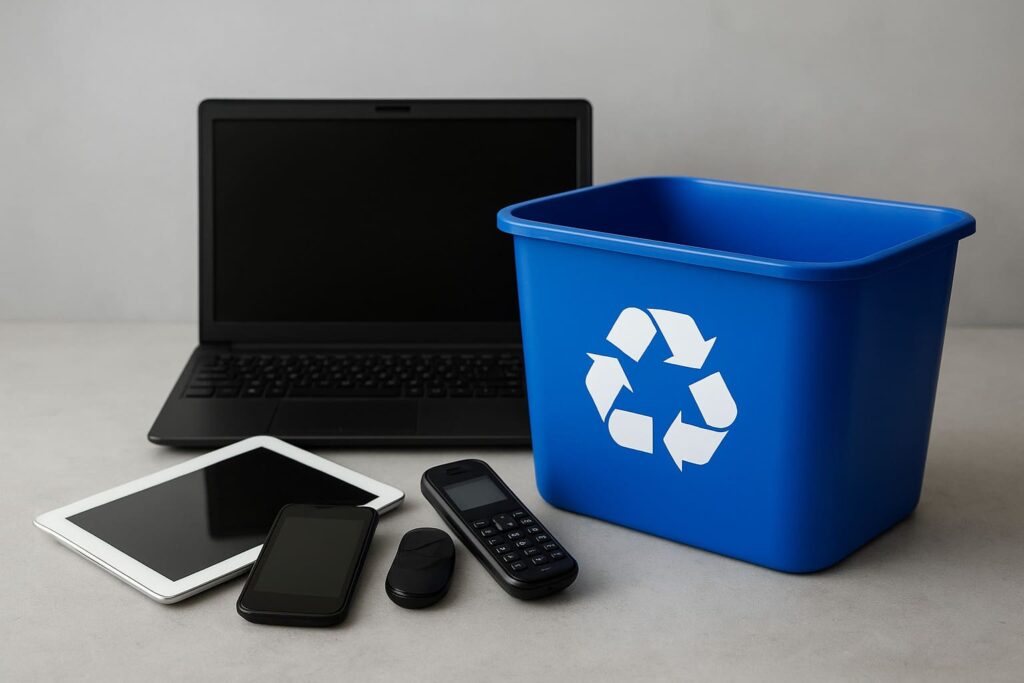What is Electronic waste recycling for Winnipeg homeowners?
- Electronics often contain lead, mercury, and other materials that are harmful if released to soil or water.
- Many devices hold recoverable metals and plastics that can re-enter the manufacturing supply.
- Proper recycling reduces landfill burden and prevents unsafe disposal practices. Research and local guidance emphasize reuse first, then responsible recycling for items that can no longer be used.
Where to drop off Electronic waste recycling in Winnipeg
Other convenient options
- EPRA / Recycle My Electronics drop-off locations: a province-wide network of authorized drop-off points for regulated electronics. Use their online locator to find the nearest participating site.
- Retail take-back and community collection events: Some electronics retailers and community events accept certain devices for recycling. Check program pages before you go. Recycle My Electronics
- Private recyclers and certified partners: organizations such as the Electronic Recycling Association and other local businesses provide drop-off, pickup, and secure data destruction. These can be useful when you need extra services, like on-site data wiping or donation routes. Electronics Recycling Association
How does electronic waste recycling at 4R depots work
What happens next: from collection to processing
What electronics can you recycle?
- Small consumer electronics: phones, tablets, cameras, and chargers.
- Computers and peripherals: desktops, laptops, monitors, keyboards, and mice.
- Audio/video gear: stereos, DVD players, set-top boxes, and small speakers.
- Televisions and displays: many programs accept televisions, though some drop-off limits or size rules may apply.
- Small appliances: microwaves, toasters, and similar items are often accepted at 4R depots or specialty routes. City of Winnipeg
Items that may need special handling
- Large appliances such as fridges and freezers have specific rules because of refrigerants.
- Batteries and large lithium-ion packs should be handled separately to prevent fire risk. Use dedicated battery recycling routes.
- Items with hazardous components, like fluorescent lamps, might be accepted at different drop-off streams. Check the depot or program guidance.
How to prepare devices for electronic waste recycling
- Back up and securely erase personal data: remove storage drives or perform a secure wipe using built-in OS tools or certified data-destruction services if privacy is a concern.
- Remove batteries and tape terminals as required; place batteries in approved containers or take them to battery recycling points.
- Keep cords, chargers, and accessories together where practical to improve reuse chances.
- Clean devices lightly and remove loose parts that could cause damage in transport.
- Check for manufacturer take-back instructions or donation potential before recycling. news.umanitoba.ca
Finding the right Electronic waste recycling near me
The benefits of recycling electronic waste
- Conserves resources: metals like copper, gold, and rare earths are recovered and reused.
- Reduces pollution: proper processing keeps toxic materials from contaminating soil and water.
- Protects public health: safe handling limits exposure to hazardous elements.
- Supports local economy: recyclers and processors create jobs and local remanufacturing opportunities.
Recycling programs and provincial stewardship aim to capture as much material as possible and to direct useful equipment toward reuse when feasible.
When to choose a private pickup like Mr. Garbage and other local services
What Mr. Garbage does for you
- Walkthrough guidance on what to keep, donate, or recycle.
- Pickup and secure transport to authorized recyclers.
- Coordination for data-destruction services where needed.
Mentioning Mr. Garbage here is meant to show a practical option when depot trips aren’t feasible. Use certified providers only; avoid informal offers that lack documentation.
Real-world example: A Winnipeg household electronics cleanout
Common homeowner questions about electronic waste recycling
Can I donate working electronics instead of recycling?
What about data on old devices?
Tips for a smooth electronic waste recycling experience
- Check accepted items before you go to avoid unnecessary trips.
- Back up and erase data on devices you recycle.
- Separate batteries and tape terminals on lithium packs to reduce fire risk.
- Consider donations for working equipment; recycle what cannot be reused.
- If mobility or volume is an issue, arrange a documented pickup with a certified service like Mr. Garbage.
Conclusion
Frequently Asked Questions (FAQs)
Q1: What is electronic waste recycling, and why do I need it?
A1: Electronic waste recycling is the process of collecting and processing end-of-life electronics so that valuable materials are recovered and hazardous parts are handled safely. It prevents toxins from entering landfills and protects personal data and public health.
Q2: Where can I drop off electronic waste in Winnipeg?
A2: Start with the City of Winnipeg’s 4R depots and the EPRA / Recycle My Electronics drop-off locations. Some retailers and private recyclers also accept devices or offer pickup services.
Q3: Do I need to erase my data before recycling a computer or phone?
A3: Yes. Back up important files and securely erase or remove storage drives before recycling. If you need help, choose a recycler that offers certified data destruction.
Q4: Can I donate working electronics instead of recycling them?
A4: Absolutely. If a device still works, donation is often the best first option. Schools, charities, and community groups may accept working equipment. Otherwise, recycle through an approved program.
Q5: What if I have a large volume of electronics or need help transporting them?
A5: For large volumes, heavy items, or mobility constraints, arrange a pickup with a certified recycler or a reputable local service such as Mr. Garbage to ensure items are handled and routed correctly.

